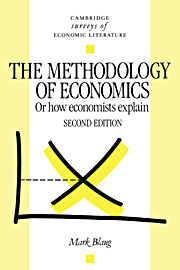Book contents
- Frontmatter
- Contents
- Preface
- Preface to first edition
- Part I What you always wanted to know about the philosophy of science but were afraid to ask
- 1 From the received view to the views of Popper
- 2 From Popper to the new heterodoxy
- Part II The history of economic methodology
- Part III A methodological appraisal of the neoclassical research program
- Part IV What have we now learned about economics?
- Glossary
- Suggestions for further reading
- Bibliography
- Name index
- Subject index
2 - From Popper to the new heterodoxy
Published online by Cambridge University Press: 10 December 2009
- Frontmatter
- Contents
- Preface
- Preface to first edition
- Part I What you always wanted to know about the philosophy of science but were afraid to ask
- 1 From the received view to the views of Popper
- 2 From Popper to the new heterodoxy
- Part II The history of economic methodology
- Part III A methodological appraisal of the neoclassical research program
- Part IV What have we now learned about economics?
- Glossary
- Suggestions for further reading
- Bibliography
- Name index
- Subject index
Summary
Kuhn's paradigms
We have seen that Popper's methodology is plainly normative, prescribing sound practice in science, possibly but not necessarily in the light of the best science of the past. To that extent, the Popperian methodology of falsificationism is in keeping with the received view on theories, although in many other respects it points away from the received view. In Kuhn's The Structure of Scientific Revolutions (1962), however, the break with the received view is almost total because his emphasis is not on normative prescription but rather on positive description. Moreover, the inclination to preserve theories and to render them immune to criticism, which Popper grudgingly accepts as a departure from best-practice science, becomes the central issue in Kuhn's explanation of scientific behavior. Kuhn regards normal science, that is, problem-solving activity in the context of an orthodox theoretical framework, as the rule and revolutionary science, or the overthrow of one framework by another in consequence of repeated refutations and mounting anomalies, as the exception in the history of science. It is tempting to say that for Popper science is always in a state of permanent revolution, the history of science being a history of continuous conjectures and refutations; for Kuhn, the history of science is marked by long periods during which the status quo is preserved, interrupted on occasions by discontinuous jumps from one ruling paradigm to another with no conceptual bridge for communicating between them.
To take our bearings, we must begin by defining terms.
- Type
- Chapter
- Information
- The Methodology of EconomicsOr, How Economists Explain, pp. 27 - 48Publisher: Cambridge University PressPrint publication year: 1992

